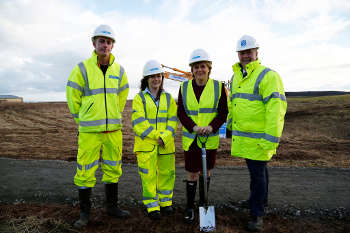Galliford Try will in future avoid large, fixed-price infrastructure projects after construction losses, including two high-profile schemes in Scotland, made an £89m hole in its profits.
The firm announced pre-tax profits of £58.7m, with profits from its Linden Homes and Partnerships and Regeneration divisions offset by losses of £88.8m from its Construction business.

Nicola Sturgeon kicks off the AWPR/Balmedie-Tipperty scheme
In a statement, it reported ‘strong underlying performance across all three businesses’ with an £87.9m charge in respect of two infrastructure joint ventures classified as exceptional.
It said: ‘We have put into place rigorous processes to ensure a more disciplined approach towards project selection. Today, we are focusing on lower-risk public and regulated sectors and two-stage negotiated work, rather than large infrastructure projects on fixed-price, all-risk contracts which these legacy projects were.'
Chief executive Peter Truscott said: ‘While the one-off costs relating to legacy contracts in Construction have impacted the reported financial performance, we remain confident in the prospects for the business, with the underlying portfolio of newer contracts performing well, and simplified and strengthened processes proving effective.’
The two schemes are believed to be the recently opened Queensferry Crossing and the Balmedie-Tipperty section of the Aberdeen Western Peripheral Route project.
The firm said: ‘As these challenging contracts draw closer to completion, we are encouraged by the performance of our new contracts. During the year, we improved our risk management process for project selection, increasing our rigour in choosing which projects to take on. This selectivity is increasingly reflected in our culture and is resulting in more projects being ruled out earlier in the selection process.’
It added: ‘During the year, we continued to benefit from areas such as defence which are now starting to see long-term capital funding programmes come to fruition and sectors such as education and highways, where longstanding framework positions have allowed us to capitalise on the greater opportunities coming forward.’
Register now for full access
Register just once to get unrestricted, real-time coverage of the issues and challenges facing UK transport and highways engineers.
Full website content includes the latest news, exclusive commentary from leading industry figures and detailed topical analysis of the highways, transportation, environment and place-shaping sectors.
Use the link below to register your details for full, free access.
Already a registered? Login